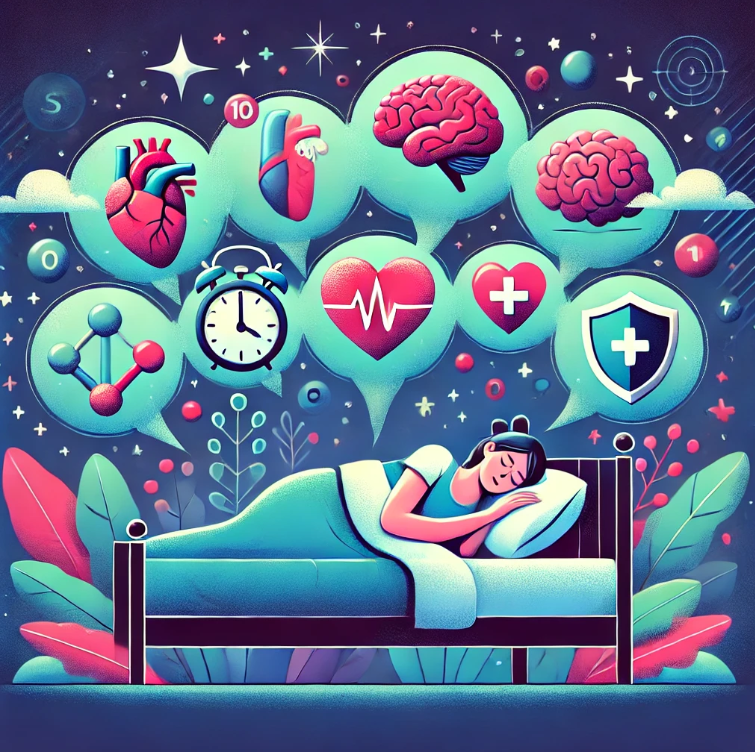In the modern age, where flexibility in work and lifestyle has become the norm, many people find themselves sleeping late and waking up late. But is it bad to sleep late and wake up late? While some argue that as long as you get sufficient rest, the timing doesn’t matter, others believe it can have profound effects on your health and well-being.
This blog explores what happens if you sleep late and wake up late, the side effects of sleeping late, and whether this lifestyle is sustainable. We also provide insights from research, data, and expert opinions. Let’s dive in!
The Science Behind Sleep Timing
Our bodies operate on an internal clock known as the circadian rhythm, which is influenced by natural light and darkness. This rhythm regulates sleep, digestion, hormone release, and other vital processes. When you consistently sleep late, it disrupts your circadian rhythm, leading to potential health issues.
Table: Impact of Circadian Rhythm Disruption
| Effect | Description |
|---|---|
| Hormonal Imbalance | Irregular sleep affects melatonin and cortisol. |
| Metabolic Issues | Higher risk of obesity and diabetes. |
| Mental Health Challenges | Increased anxiety, depression, and mood swings. |
| Reduced Productivity | Lower focus and energy during daylight hours. |
What Happens If You Sleep Late and Wake Up Late?
Sleeping late and waking up late might feel comfortable, especially for night owls, but the long-term effects can be concerning. Here are some possible outcomes:
- Reduced Exposure to Natural Light
Waking up late often reduces your time spent in sunlight, which can lead to vitamin D deficiency, mood swings, and a weakened immune system. - Impact on Work-Life Balance
If your schedule doesn’t align with societal norms, you might struggle with meeting deadlines or attending early morning commitments. - Decreased Social Interaction
Many social and professional activities occur during the day, and a late routine might isolate you from these.
Is It Bad to Sleep Late but Get 8 Hours?
You might wonder if you’re still getting the recommended 7-9 hours of sleep, does timing matter? The answer is yes. Studies suggest that sleeping during odd hours, even with sufficient duration, can still lead to health risks like:
- Increased stress levels
- Poor gut health
- Higher blood pressure
What Happens If You Sleep Late Everyday?
Sleeping late every day can normalize a disrupted sleep cycle, but not without consequences:
- Chronic Fatigue
Even if you sleep for 8 hours, irregular timing can leave you feeling tired and lethargic. - Risk of Chronic Diseases
Prolonged late-night habits have been linked to heart disease, diabetes, and even reduced life expectancy. - Poor Mental Health
People who sleep late daily often report higher levels of anxiety and depression.
What Happens If You Sleep Late and Wake Up Early?
Sleeping late and waking up early is a recipe for sleep deprivation. Chronic sleep deprivation impacts:
- Memory: Reduced ability to focus and retain information.
- Immune System: Increased susceptibility to illness.
- Mood: Heightened irritability and stress.

Advantages vs. Disadvantages of Waking Up Late
Let’s explore the pros and cons of sleeping late and waking up late:
Table: Advantages and Disadvantages of Waking Up Late
| Advantages | Disadvantages |
| Increased evening productivity | Misalignment with social norms |
| Flexible scheduling | Reduced sunlight exposure |
| Creative bursts at night | Higher risk of chronic diseases |
What Experts Say
Experts from sleep research institutions emphasize aligning sleep patterns with the natural light-dark cycle. Sleeping late occasionally is unlikely to cause harm, but making it a habit can have cumulative effects. Incorporating healthier practices like regular sleep schedules, exposure to sunlight, and limiting screen time before bed can mitigate some risks.
How to Transition to a Healthier Sleep Schedule
If you’re currently sleeping late and waking up late, consider these tips:
- Gradual Adjustment: Shift your bedtime by 15-30 minutes earlier each night.
- Set Alarms: Use alarms for both sleeping and waking up.
- Morning Sunlight: Spend at least 15 minutes in natural sunlight after waking up.
- Limit Stimulants: Avoid caffeine and heavy meals close to bedtime.
- Digital Detox: Reduce screen exposure 1 hour before bed.
FAQs About Sleeping Late and Waking Up Late
- Is it bad to sleep late but get 8 hours?
Yes, it can still disrupt your circadian rhythm and affect overall health. - What happens if you sleep late and wake up late?
You may experience reduced sunlight exposure, social isolation, and health risks. - What happens if you sleep late everyday?
Chronic fatigue, mental health challenges, and metabolic issues are likely outcomes. - What happens if you sleep late and wake up early?
This leads to sleep deprivation, impacting memory, mood, and immune function. - Are there disadvantages of waking up late?
Yes, including reduced productivity during daylight hours and potential health risks.


